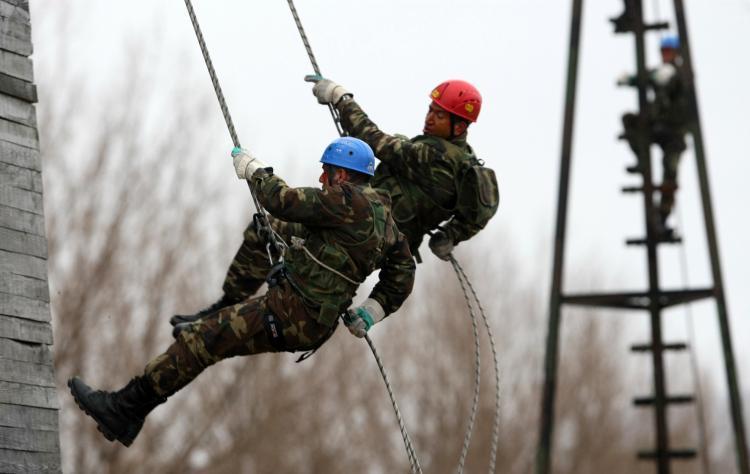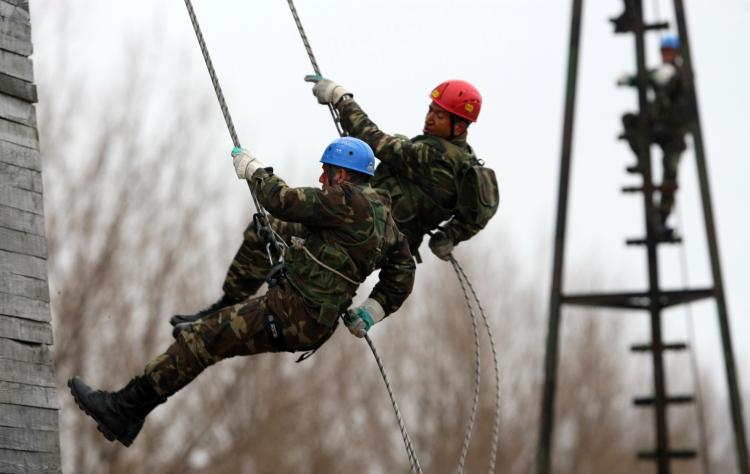Afghanistan is a complex region. Victory goes much deeper than whether or not the U.S. and the 44 allied countries can defeat the Taliban. German Defense Minister Karl-Theodor zu Guttenberg told Reuters that, “Afghanistan will not be won with military means.”
The aim of Obama’s troop surge is not to defeat the Taliban militarily. According to geopolitical intelligence company, Stratfor, “even with tens of thousands of additional troops, there will not be enough military personnel to impose a military reality on a country significantly larger in area and roughly the same population [but far more diffuse] than Iraq.”
Instead, success will rely on whether the country can become stable before the scheduled 2011 troop withdrawal. The challenge entails clearing corruption from the Afghani government and establishing a strong security force recognized by the Afghani people.
Doing this however, could be no less of a challenge.
Afghanistan is the world’s largest producer of opium, and according to U.S. Ambassador to Afghanistan Karl Eikenberry, this is having a large influence on government corruption.
During a Dec. 8, 2009 House hearing on Obama’s Afghanistan strategy Eikenberry said “the challenges are daunting right now for government accountability,” he added “it’s perhaps our most difficult task.”
Afghanistan is still new to modern politics. Until recently, the country was ruled largely by warlords and tribal leaders. According to Eikenberry, initiatives to eliminate corruption from the region include establishing an Afghan FBI and establishing a certification program for Afghan ministries.
Eikenberry said tackling corruption in the region is “central to our success.”
The Challenge for Troops
While stopping corruption is essential to stabilizing the region, establishing a strong Afghan security force will be the key to defending it from Taliban and al-Qaeda insurgents.
Including the current troop surge, there will be close to 68,000 U.S. troops in Afghanistan and more than 45,000 NATO and International Security Assistance Force troops.
The plan is to train and establish an Afghan army 134,000 strong by 2011.
Although U.S. troops are scheduled to withdraw in two years, Afghan Defense Ministry spokesman Mohammad Zahir Azimi, told RIA Novosti (Russian Information Agency) that within four years the Afghani military should be able to defend the country without help from foreign troops, Stratfor reported.
According to General Stanley McChrystal, a strategy in building the Afghan security force will be to first increase the number of trainees who have had any level of training at all.
The long-term goal will be for the Afghanis to recognize the security force. On Dec. 8 McChrystal said, “In the end of the day the Afghan police must be viewed with credibility to the Afghan people.”
The Taliban Threat
The wild card in this will be the stability of the Taliban and al-Qaeda.
One day after the Pentagon announced the deployment of 6,000 troops to Afghanistan on Dec. 22, the top Pakistani Taliban commander, Waliur Rehman, announced he also sent thousands of insurgents to Afghanistan, according to AP.
“The Taliban believe they are winning in Afghanistan,” said retired Four Star-General Barry McCaffrey in a Dec. 8 report. “The Afghan people do not know who will prevail—their government or the Taliban.”
They are also using the 2011 deadline as a propaganda tool, spreading the message that, “The West has the clocks ... but the Taliban have the time,” according to McCaffrey.
The Taliban has a “serious presence” in 160 of 364 districts in Afghanistan, he said.
Still, the Taliban is not a popular force in Afghanistan.
According to McChrystal and other sources, most of the Taliban’s influence is brought about through threats and coercion.
Even among some radical jihadist groups, al-Qaeda and the Taliban are considered too extreme. A document that questions the religious integrity of al-Qaeda within Islam was published on Sept. 6, 2009.
The 417-page document sets forth a code of conduct for radical Islamists, while questioning the operations of al-Qaeda. It was released after more than two years of talks between leaders of the Libyan Islamic Fighting Group (LIFG) and Libyan security officials.
According to CNN, the document challenges al-Qaeda, saying jihad has ethics and morals. “That means it is forbidden to kill women, children, elderly people, priests, messengers, traders, and the like. Betrayal is prohibited and it is vital to keep promises and treat prisoners of war in a good way. Standing by those ethics is what distinguishes Muslims’ jihad from the wars of other nations.”
The document is now being circulated widely.
Particularly in Libya, where al-Qaeda does much of its recruiting, the religious document can potentially have a large impact. According to CNN, it is also being circulated amongst respected religious scholars in the Middle East.






